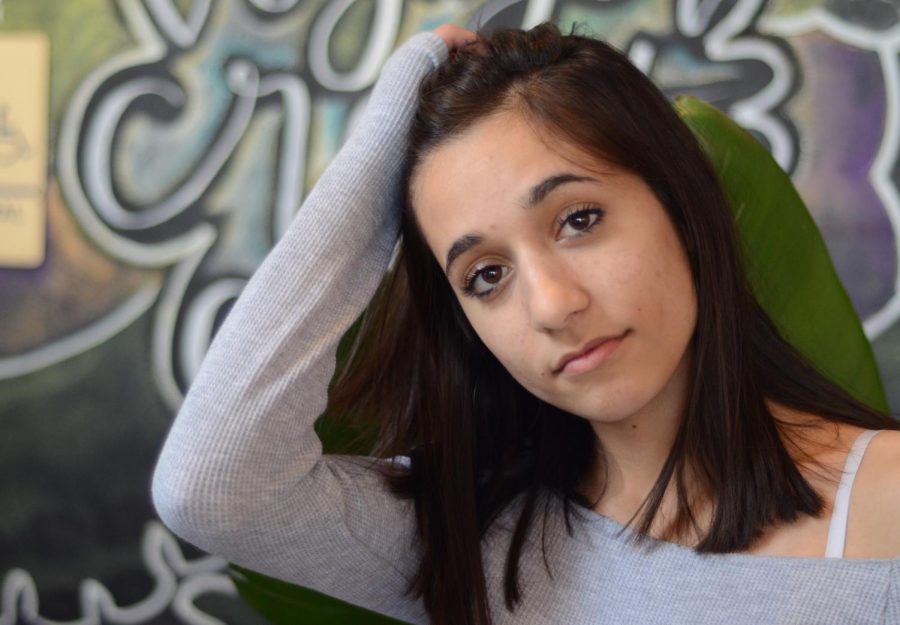Humans of Harker: Sameep Mangat seeks out stories
“When my brother and I were younger, we would watch Disney movies together and that was the only thing that bonded us because we hated each other at that point,” Sameep Mangat (12) said. “He always called himself Tigger because he thought that Tigger embodied his personality and he thought it was super representative of his bounciness and his love of life and the fact that he gave hugs to people and that he was this really bright person. I wanted a way to fit into that story, so I assigned myself Eeyore just because at that time in my life, I liked to describe myself as being emotionally deep and sort of sad, but more reserved in that sense. We became Eeyore and Tigger and we called our life the Hundred Acre Story.”
February 23, 2018
After all these years, Sameep Mangat (12) still has her Eeyore-themed pencil pouch.
“When my brother and I were younger, we would watch Disney movies together and that was the only thing that bonded us because we hated each other at that point,” she said. “He always called himself Tigger because he thought that Tigger embodied his personality and he thought it was super representative of his bounciness and his love of life and the fact that he gave hugs to people and that he was this really bright person. I wanted a way to fit into that story, so I assigned myself Eeyore just because at that time in my life, I liked to describe myself as being emotionally deep and sort of sad, but more reserved in that sense. We became Eeyore and Tigger and we called our life the Hundred Acre Story.”
Her older brother, Simar Mangat (‘13), remembered an idyllic “Disney moment” they shared.
“After a Cars themed drive in dinner, Sameep and I walked outside into a torrent of rain,” Simar said. “We looked at one another, locked arms, and danced down the street as we got soaked to our bone. Sameep’s the friend that’s always there for you, in times of laughter or joy, rain or sunshine, Disney World or real life.”
Sameep strives to empathize with others. While watching a slam poet perform “How to Succeed in Heartbreak,” she first heard the saying “Go to museums, realize other things have history too.”
“I think just that idea that we all possess backgrounds and histories and stories and memories is so profound to me just because something that I always like to do is find out people’s stories,” Sameep said. “I think that’s the most interesting thing to do, so hearing that in a poem, it resonated with me because I feel like history is something that’s so important to all of us.”
Last summer, Sameep volunteered at a home with teen mothers in Peru.
“There was this little girl, and she heard me singing, and she ran up, and she came to no one else, she was super shy, and she came up and sat in my lap and asked me ‘otra ves,’ which is ‘again,’” Sameep said. “And so until she fell asleep, I was just rocking her and singing ‘Twinkle, Twinkle Little Star,’ and every time I stopped, she asked me to repeat it, and at the end of that I remember her just looking up at me and smiling. I feel like that was a moment that I felt like I had succeeded in life.”
Even performing arts has become a way for Sameep to learn and understand others’ stories.
“I came to love [acting] because I think it’s so interesting when you put yourself in someone else’s shoes and you’re forced to empathize with this character that you just gotten to meet or know within the past month,” she said. “Forcing yourself to become that character is so eye-opening and so useful for daily life because you learn to interact with people, you learn to interact with yourself because you’re becoming a new person, so that was one reason I kept doing acting and singing.”
Sameep’s passion for writing and mental health awareness culminated in a book she wrote the summer after junior year: Being Enough.
“I am a teenager,” it begins. “I am sixteen years old. “I may have never worried about having enough, but I have always worried about being enough.” And so it launches into a narrative of woven anecdotes and definitions — ultimately starting conversations between teenagers and their parents.
As someone who escapes labels — writer, singer or actress are far too narrow — Sameep spends much of her time thinking about identity.
“I think that’s the coolest thing — to be rather than be defined,” she said.


















![“[Building nerf blasters] became this outlet of creativity for me that hasn't been matched by anything else. The process [of] making a build complete to your desire is such a painstakingly difficult process, but I've had to learn from [the skills needed from] soldering to proper painting. There's so many different options for everything, if you think about it, it exists. The best part is [that] if it doesn't exist, you can build it yourself," Ishaan Parate said.](https://harkeraquila.com/wp-content/uploads/2022/08/DSC_8149-900x604.jpg)




![“When I came into high school, I was ready to be a follower. But DECA was a game changer for me. It helped me overcome my fear of public speaking, and it's played such a major role in who I've become today. To be able to successfully lead a chapter of 150 students, an officer team and be one of the upperclassmen I once really admired is something I'm [really] proud of,” Anvitha Tummala ('21) said.](https://harkeraquila.com/wp-content/uploads/2021/07/Screen-Shot-2021-07-25-at-9.50.05-AM-900x594.png)







![“I think getting up in the morning and having a sense of purpose [is exciting]. I think without a certain amount of drive, life is kind of obsolete and mundane, and I think having that every single day is what makes each day unique and kind of makes life exciting,” Neymika Jain (12) said.](https://harkeraquila.com/wp-content/uploads/2017/06/Screen-Shot-2017-06-03-at-4.54.16-PM.png)








![“My slogan is ‘slow feet, don’t eat, and I’m hungry.’ You need to run fast to get where you are–you aren't going to get those championships if you aren't fast,” Angel Cervantes (12) said. “I want to do well in school on my tests and in track and win championships for my team. I live by that, [and] I can do that anywhere: in the classroom or on the field.”](https://harkeraquila.com/wp-content/uploads/2018/06/DSC5146-900x601.jpg)
![“[Volleyball has] taught me how to fall correctly, and another thing it taught is that you don’t have to be the best at something to be good at it. If you just hit the ball in a smart way, then it still scores points and you’re good at it. You could be a background player and still make a much bigger impact on the team than you would think,” Anya Gert (’20) said.](https://harkeraquila.com/wp-content/uploads/2020/06/AnnaGert_JinTuan_HoHPhotoEdited-600x900.jpeg)

![“I'm not nearly there yet, but [my confidence has] definitely been getting better since I was pretty shy and timid coming into Harker my freshman year. I know that there's a lot of people that are really confident in what they do, and I really admire them. Everyone's so driven and that has really pushed me to kind of try to find my own place in high school and be more confident,” Alyssa Huang (’20) said.](https://harkeraquila.com/wp-content/uploads/2020/06/AlyssaHuang_EmilyChen_HoHPhoto-900x749.jpeg)









